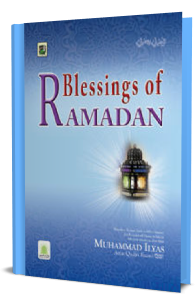
Dar-ul-Ifta Ahl-e-Sunnat
Mufti Abu Muhammad Ali Asghar Attari Madani
Losing consciousness while fasting?
Question 1: A person ate Sahari with the intention of fasting in the blessed month of Ramadan, but then, for approximately 3 hours between 7 o’clock and 10 o’clock, he became unconscious. The question is, will this unconsciousness affect his fast or not?
بِسْمِ اللهِ الرَّحْمٰنِ الرَّحِیْمِ
اَلْجَوَابُ بِعَوْنِ الْمَلِکِ الْوَھَّابِ اَللّٰھُمَّ ھِدَایَةَ الْحَقِّ وَالصَّوَابِ
Answer: In the aforementioned case, if nothing that breaks the fast (such as medicine, water, etc.) was entered into the mouth or nose of the person in order to bring him back to consciousness, then merely falling unconscious will not break the fast. This is because unconsciousness itself does not invalidate the fast. (Al-Mabsoot-lis-Sarakhsi, vol. 3, p. 70; Bahar-e-Shari’at, vol. 1, p. 967)
وَاللہُ اَعْلَمُ عَزَّوَجَلَّ وَ رَسُوْلُہٗ اَعْلَم صلَّی اللہ علیہ واٰلہٖ وسلَّم
Praying Taraweeh while sitting
Question 2: In the book, ‘Faizan-e-Ramadan,’ it is stated that, ‘Offering Taraweeh while sitting down, without a valid reason, is disliked (Makruh)…’ Does this mean it is slightly disliked (Makruh Tanzeehi) or prohibitively disliked (Makruh Tahreemi)?
بِسْمِ اللهِ الرَّحْمٰنِ الرَّحِیْمِ
اَلْجَوَابُ بِعَوْنِ الْمَلِکِ الْوَھَّابِ اَللّٰھُمَّ ھِدَایَةَ الْحَقِّ وَالصَّوَابِ
Answer: There is unanimous consensus among the jurists of Islam that praying Taraweeh while sitting down without a valid reason is contrary to the Mustahab. Therefore, in the aforementioned case, Makruh refers to the slightly disliked (Makruh Tanzeehi). However, keep in mind that even though it will be valid to offer Taraweeh Salah while sitting without a valid reason, the one doing so will receive half of the reward that they could have attained, had they prayed Taraweeh while standing. Therefore, if there is no valid reason to sit down, one must attempt to offer Taraweeh while standing so that s/he can obtain the full reward. (Rad-ul-Muhtar, Ma’ Durr-e-Mukhtar, vol. 2, p. 603; Bahar-e-Shari’at, vol. 1, p. 693, summarised)
وَاللہُ اَعْلَمُ عَزَّوَجَلَّ وَ رَسُوْلُہٗ اَعْلَم صلَّی اللہ علیہ واٰلہٖ وسلَّم
A pertinent issue of Zakat
Question 3: Kindly explain if Zakat will be payable in the following two cases:
1. An individual purchases chicks, with the intention of nurturing them and selling them on when they grow bigger.
2. A person purchases chicks with the intention of nurturing them, taking their eggs and selling the eggs, but not the chickens.
بِسْمِ اللهِ الرَّحْمٰنِ الرَّحِیْمِ
اَلْجَوَابُ بِعَوْنِ الْمَلِکِ الْوَھَّابِ اَللّٰھُمَّ ھِدَایَةَ الْحَقِّ وَالصَّوَابِ
Answer:
1. In the aforementioned case, the chickens will be included in the wealth of Zakat. Therefore, if the chickens alone meet the Zakat threshold (Nisab) or they reach the threshold when combined with other assets such as gold, silver, business inventory and merchandise, bonds, or cash, and other conditions are also met, then Zakat will be necessary on them. Nisab refers to a personal wealth of 52.5 Tola (612.35 grams of) silver, or any other wealth equivalent to this in value, such as cash. (Al-Durr-e-Mukhtar Matan Rad-ul-Muhtar, vol. 3, p. 234; Bahar-e-Shari’at, vol. 1, p. 892)
2. In the second case, Zakat will neither be due on the chicks/chickens nor on the eggs that are harvested from them because these are not Zakat able merchandise: The chickens are not considered trade merchandise as they were not purchased to be sold and the eggs are not trade merchandise because they were not even purchased. However, the income generated by selling the chickens or the eggs will certainly be included in the Nisab of Zakat. (Al-‘Inayah Hamish Fath-ul-Qadeer, vol. 2, p. 178 selected; Bahar-e-Shari’at, vol. 1, p. 883)
وَاللہُ اَعْلَمُ عَزَّوَجَلَّ وَ رَسُوْلُہٗ اَعْلَم صلَّی اللہ علیہ واٰلہٖ وسلَّم
Fasting and worshiping on the 15th Sha’ban
Question 4: Are the practices of worshiping on the night of 15th Sha’ban and fasting during the day proven from the Hadith?
بِسْمِ اللهِ الرَّحْمٰنِ الرَّحِیْمِ
اَلْجَوَابُ بِعَوْنِ الْمَلِکِ الْوَھَّابِ اَللّٰھُمَّ ھِدَایَةَ الْحَقِّ وَالصَّوَابِ
Answer: Yes, indeed! Encouragement for fasting on the 15 of Sha’ban and worshiping in its night is found in the Hadith.
It is reported from Sayyiduna Ali Al-Murtada رَضِىَ الـلّٰـهُ عَـنْهُ that the Messenger of Allah صَلَّى الـلّٰـهُ عَلَيْهِ وَاٰلِهٖ وَسَلَّم stated, ‘When the night of 15th of Sha’ban arrives, then observe Qiyam (pray) in that night and fast during the day, for Allah Almighty reveals His special manifestation on the skies of the world from sunset and says, ‘Is there anyone seeking forgiveness so that I may forgive them? Is there anyone seeking sustenance so that I may provide sustenance for them? Is there anyone afflicted with difficulties so that I may grant relief to them? Is there anyone as such! Is there anyone as such! He says this until the beginning of Fajr,’ (Sunan Ibn-e-Majah, vol. 2, p. 160, Hadith 1388)
وَاللہُ اَعْلَمُ عَزَّوَجَلَّ وَ رَسُوْلُہٗ اَعْلَم صلَّی اللہ علیہ واٰلہٖ وسلَّم

















Comments